#it's my favorite essay of barthes's even though i definitely want to read more
Explore tagged Tumblr posts
Text
i’m not gonna make my own big post about the kfam fandom drama, but if anyone’s interested, i think this would be a great time for everyone to read/reread The Death of the Author by Roland Barthes. It’s very short! You’re all in quarantine! You have the time!
The title gets thrown around a lot online, and though it’s not used incorrectly, I also think it’s worth mentioning that The Death of the Author in its original intention isn’t a wholly negative thing or used only with writers you dislike or disagree with.
For folks who use The Death of the Author in academia, it’s how you read everything from Shakespeare to Plato. It’s about removing an author and their intentions from a text in order to prioritize the reader’s relationship with the actual content, free of hierarchy. Death of the Author gives a text infinite meanings instead of a hierarchical meaning determined by the author.
For anyone upset by what’s going on in the kfam fandom - or anyone who wants to enjoy but also be critical of texts - I highly recommend utilizing this framework in your consumption of media. Because it means that your interpretation of the text is always inherently more important than the writer’s.
And, very importantly, The Death of the Author isn’t something fandom made up because they’re special snowflakes who hate writers uwu!!! The Death of the Author is an instrumental part of the postmodern literary movement, and an essential tool in the past fifty years of literary critique. Use it as much or as little as you like, inside fandom spaces, academia, whatever benefits you - but I think it’s a particularly useful tool for divorcing the messy drama of fandom from the show and/or its characters.
#king falls am#kfam#if you're interested also read from work to text!#it's my favorite essay of barthes's even though i definitely want to read more#also i'm not an expert by any means but i've taken multiple literary theory courses so i do know what i'm talking about
36 notes
·
View notes
Text
A Series on Series 01: Bridgerton

Hi. I’m Alex, a YouTube newbie.
I resurrected this channel mostly because I wanted to do this thing. It’s something I’d planned back in 2019 and never got around to it because I was too lazy. However… life happened and I thought that with everything that happened in 2020, I should stop procrastinating. So I did nothing in 2020 -- aside from the usual like work. I was one of the lucky ones whose only inconvenience really was being unable to go outside when I wanted to -- which, to be honest, wasn’t really that often. In ordinary circumstances, I don’t really like going out. But the thought of having an actual lockdown order PREVENTING me from going out, well, that’s a whole ‘nother thing.
So 2020 was a bust, but I wanted 2021 to be different. However long this pandemic is going to go, I wanted to make better use of my ‘free’ time.
On to the show. I’m doing A Series on Series, where I talk about my favorite book series. I figured since I read a lot of them, might as well talk about them right here. So let’s start with what’s currently popular: Bridgerton.

So I watched Bridgerton on Netflix the day it came out in my country, January 1.
I’d actually read the Julia Quinn series -- all eight books -- years ago. After I watched the first season, I went back and reread the first book in the series which is the basis for this first season.
Just a disclaimer: I’m watching this through the lens of someone who has read historical romance novels almost my entire life. I understand that there are a lot of issues that should/need to be addressed here like race. However, as I’ve read the books that this series is based on, I know the period in which it’s set. That is to say, the characters are mostly white and mostly straight. It’s the overarching theme of most historical romance novels.
With that said, it’s not to say that I won’t have comments about current issues that we see play out in the series, but I just want to ground this -- this whole thing -- on my own experience mostly because that’s really my frame of reference.
On the race issue, my comments are going to be from someone who is a person of color BUT has lived all of my life in a country, Philippines, where we’re really mostly just one race. There are a lot of biracial people in my country, but for the most part our issues are nothing compared to what black people have experienced and are experiencing everywhere -- especially in the U.S. What I’m saying is, I am aware of the Black Lives Matter movement and I agree with what they stand for and what they’re fighting for. What I’m also saying is that as a person of color who lives in a country with people who have the same skin color as I am, I don’t have the same issues of representation in the media. In OUR media here, I am very much represented. However, in the U.S. people of color are in the minority and struggle with representation. I’m saying that now because we’re going to come back to that later. Also most of my comments are going to be from the lens of someone who identifies herself as a decades’ long (yes, I’m aware that I’m aging myself) historical romance reader. However, even though I used to be the kind of reader who belongs to the ‘the author is dead’ school of thought, these days, one finds it difficult to divorce the author from the work.
From “The Death of the Author,” an essay by French literary theorist, essayist, philosopher, critic and semiotician Roland Barthes. Basically, it says that the author does not factor in the reading of their work -- that their words get to be interpreted by the reader however they may. The point is not to try to understand what the author’s intentions are, and just focus on the actual work itself.
I went to school for this so I’m going to have to balance the death of the author vs my own thoughts -- immediate and otherwise -- when it comes to what I read.
So we’re good? If not, I’ll come back to it -- if you’re still here. [wink]
So in this first episode of A Series on Series: Bridgerton, I’m going to talk about my impressions regarding the series and then point out the differences between the Netflix Season 1 and the first book, The Duke and I.
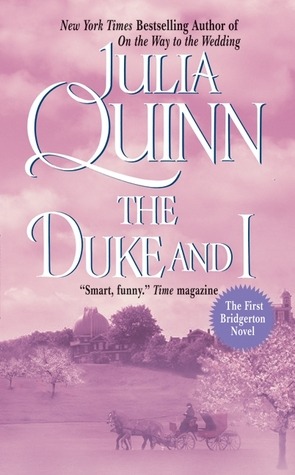
First impression of the series & some issues:
I was pleasantly surprised to see a black man play the Duke of Hastings.
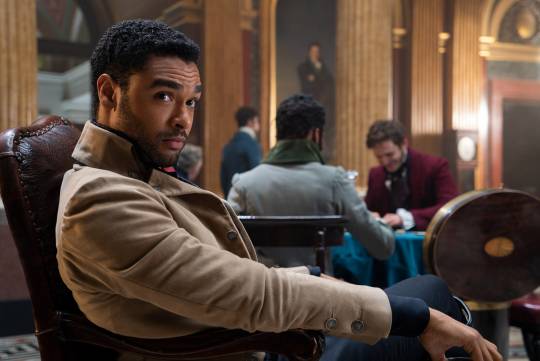
In the book, he is described as tall, dark-haired and with ice-blue eyes.
Also a pleasant, surprise? Queen Charlotte played by a black woman.

You see, some historians believe that Queen Charlotte was Britain’s first black queen.
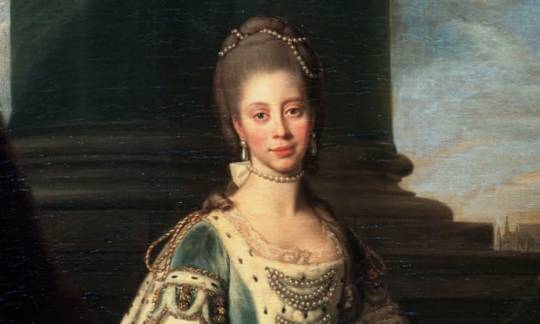
She was born the youngest daughter of a duke and a princess in the Duchy of Mecklenburg-Strelitz in northern Germany. She married King George III -- yes, of Hamilton’s ‘You’ll Be Back.’
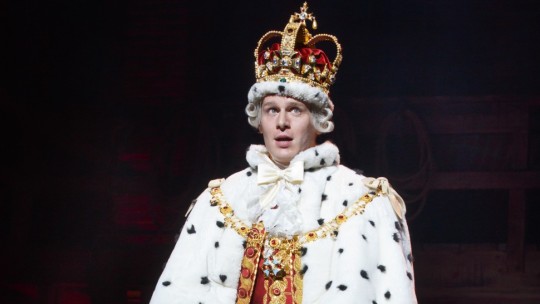
However, in this timeline set years after that, he’s more The Madness of King George.
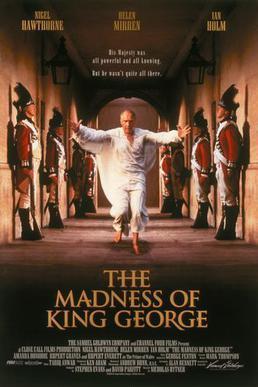
Going back, historians are split about this because while some believe they can trace her lineage to the mixed-race branch of the Portuguese royal family and that the royal physician of her time described her as having a “true mulatto face,” other historians say that it’s never been proven.
History says that she might be black or she might not be. In the series, she is, and I had absolutely no problem believing from the get-go that the black actress playing her is in fact, Queen Charlotte.
Some people actually point out the casting of black people in the series -- not just the Duke and the Queen -- but others as well like Lady Danbury, the late Duke and the current Duke’s sparring partner, Will Mondrich -- as race baiting.
Merriam-Webster defines it as the making of verbal attacks against members of a racial group. But that’s the 1961 definition. However, its other definition says it’s the unfair use of statements about race to try to influence the actions or attitudes of a particular group of people. This, I think, applies better.
As someone who isn’t black, I feel like my opinion doesn’t hold much water here -- or at least not the ‘diamond of the first water.’ Yeah, yeah. I went there.
But for me, since the series creator -- who is white -- made a big deal of wanting a diverse cast and ‘colorbind’ casting, a lot of hype surrounded the casting of black people in these particular roles -- who are white in the book. I think certain expectations were set -- whether intentionally or not -- about what it means to cast black people in historically white roles. Hence, the issue of race-baiting.
Was that an issue for me? No. But I’m not black and I’m not the one who may or may not be baited. So what I say isn’t exactly something you can hang your hat on. However, I’ll say it anyway. I like the black actors who play their characters.
In the book, Simon is almost god-like because of how handsome he is. The actor who plays him, really hot. I don’t mind that he doesn’t have ice-blue eyes.
Lady Danbury is my favorite character because of her interactions with Simon and how fierce she is as a friend and aunt. She doesn’t feature much in the book.
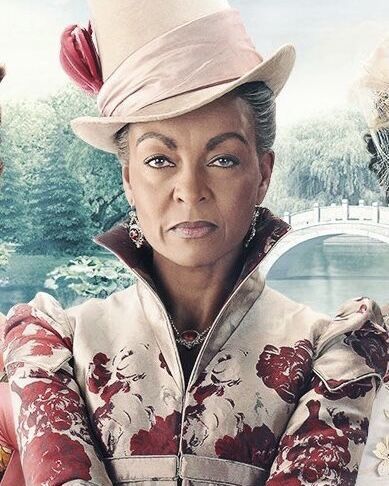
Queen Charlotte, also not in the book, is great. I especially liked her in that scene with George who was lucid one moment and then crazed the next. I didn’t think this at the time, but she must have both pitied him and been afraid for herself because he did threaten her. And what does that threat really mean for her? Is it just for her? Or for her people as well?
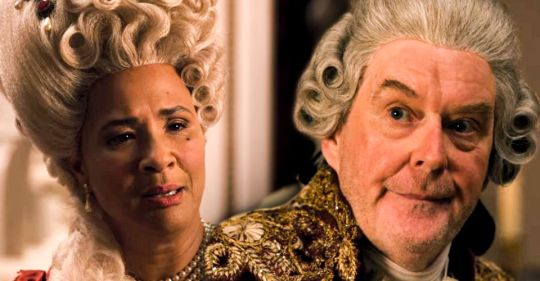
Because as Simon says later during his conversation with Lady Danbury, their ‘elevation’ relies on the whims of this madman.
The late Duke, well, he was just mean. But that part, when he gets so mad that Simon can’t speak -- I sort of understand why he wants a perfect child. It’s self-preservation. He says that their situation is precarious, that what they have will only remain theirs as long as they remain extraordinary. I felt that vehemence there. While I don’t condone it -- after all, he’s doing this ranting at a child, his child -- I understand the reason behind it. Book OG Duke doesn’t have that reason.
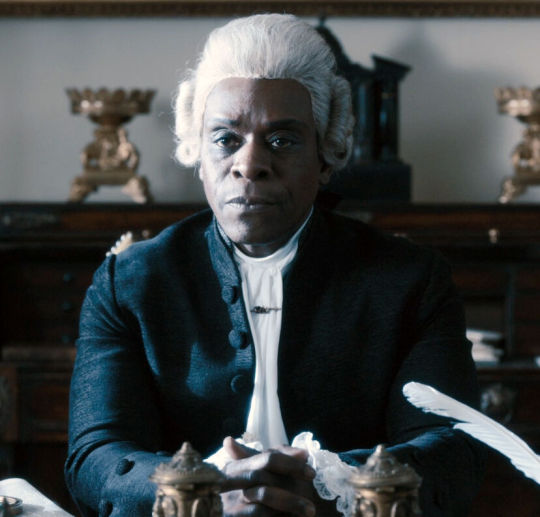
The series kind of followed the book. There were certain departures, but it didn’t really bother me.
For those of you who have not seen the series and/or read the book and don’t want any spoilers, leave now.
Okay.
SPOILER ALERT
The first 9 minutes (more or less) in the series don’t actually appear in the book. But it does a good job of setting up this world. We’re introduced to the Featheringtons and the Bridgertons.
In the first book, the Featheringtons don’t really feature as much. Also, the Baron is dead there. Then there’s Marina Thompson, the Featheringtons’ distant cousin --

Not in the book.
Then there’s Lord Anthony, Viscount Bridgerton and his mistress’ (Siena) amorous activities -- also not in the book.
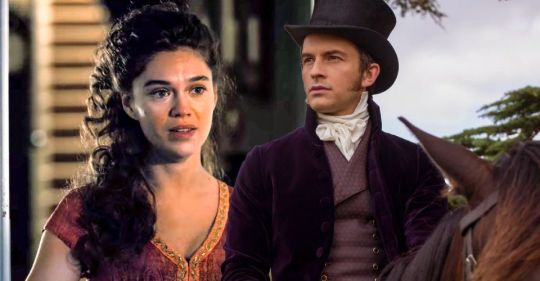
But I suppose it’s there to give us a glimpse of his character. You know, that he’s a playa.
Also, in the book, Daphne has come out -- as in debuted -- for nearly two seasons. In the series, it’s actually her first time hence the presentation to the queen.
Lady Danbury’s ball is in the book, but Daphne’s entrance which causes a stir due to her being proclaimed as ‘flawless’ by the Queen and --
#recordscratch
Did you think I’d forgotten about Lady Whistledown? Of course not. Especially when she’s voiced by Julie Andrews. I love that they chose her to be Lady Whistledown, but for the purpose of this comparison, I won’t be dwelling much on her, as much as I love Dame Julie Andrews.
#backtoourregularprogramming
Lady Whistledown as ‘a diamond of the first water’ doesn’t happen in the book. While book Daphne was by no means unattractive, according to her: ‘no one was dazzled by her beauty, stunned into speechlessness by her presence…’
Then there’s how Daphne and Simon meet. In the series, Daphne bumps into Simon accidentally, trying to escape Nigel Berbrook. In the book… it’s a little complicated.
First, there’s when and where (and really how their ‘grand scheme’ is concocted). In the series, it happens at Vauxhall Gardens where Simon overhears Daphne and Nigel Berbrook arguing. Then he discovers them after Daphne hits Lord Berbrook when he tries to assault her. Then Simon concocts the scheme with the dramatic cutaways of them rejoining the crowd as they watch the fireworks.
In the book, this actually happens at Lady Danbury’s ball (which we see in the series; the ball. The scene with Berbrook does happen, but it’s at the ball, off a corner. It’s how Daphne and Simon actually met. Anyway, it’s a whole coverup. They leave the unconscious Berbrook and they go back to the ballroom, separately.
Simon meets Daphne’s brothers and they end up introducing him to Daphne and they both agree to pretend that they’d never met before. Anyway, Simon gets all these looks from Lady Featherington and the other mamas and feels the need to escape. He then asks Daphne to dance.
THIS is where and when they concoct the scheme. The plan -- thought of by Simon, same in the series -- actually happens during this -- their first dance at that ball. AFTER their witty repartee, while waltzing. They multitask.
And unlike what happens in the series, the scheme didn’t happen because Daphne needed to be saved from ruin. Simon proposed it because he wanted an out from being stalked by ambitious mamas and offered it to Daphne AND this is a departure from the series -- to make her more desirable to other men.
See, in the book, Daphne always gets FRIENDZONED. I know, I know… but the term really does apply to her here. And with no malice, really.
They don’t view her as someone desirable. She says that she’s still unmarried “because everyone sees me as a friend. No one ever has any romantic interest in me. Except Nigel.”
So Simon’s reason of “men are always interested in a woman if they think other men are interested,” which he also says in the series is due to this.
So to sum up the difference: In the series, it’s to save Daphne from ruin; in the books, it’s so she no longer gets friendzoned.
So they both agree and the next day…
In the series, Daphne and Simon start to hang out and they go out on dates.
Kind of the same in the books, BUT they let Anthony in on the secret.
Anthony was incensed because Simon appears to be breaking the bro code. You know, the one where family is off limits? So they had to tell him. Of course he thinks it’s stupid, but goes along with it because he does see the benefits for Daphne.
In the series, Anthony is in the dark.
Anyway, the dates. BECAUSE this is a historical romance novel set in the regency period, book Simon isn’t quite so bold. The spoon scene?
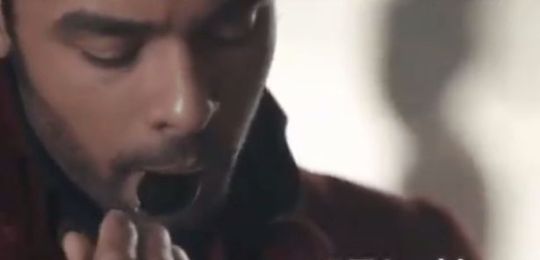
Not in the book.
The scene where Simon basically gives WAP tips to Daphne?
Not in the book.
And the biggest plot in the series that isn’t in the book?
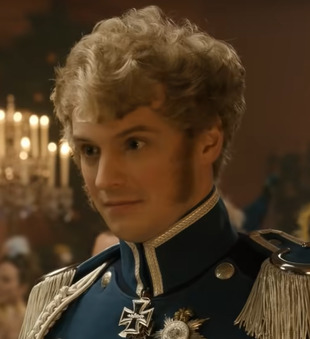
Yeah... he’s not in the book.
But the part where Anthony catches them in flagrante delicto?

That happens.
And the duel?
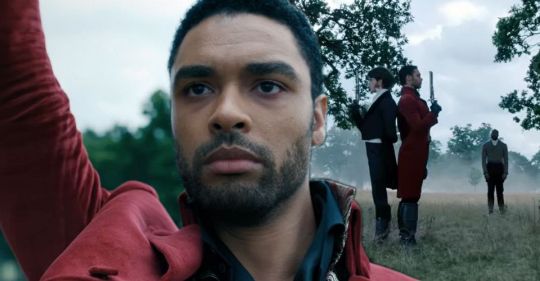
In the book.
The heartfelt speech to the queen?
Not in the book.
The scene where Mama Bridgerton tries (and fails) to explain the birds and the bees?
Happens. And it’s actually funnier in the book because Daphne asks her, “So you did this eight times?” (whisper) And her mother blushes furiously and says that, no, not just eight times because sometimes you do it because you like to.
Read the book. I found it funnier than the scene on Netflix. For one, Daphne is actually quite eager for this conversation “I’ve waited for this all week.” -- which shocks Mama.
The wedding?
Kind of the same, since Daphne only remembered the funny moments -- which were not shown in the series.
And I know you’re waiting for this: the wedding night.
Um, they were different.
For one thing, the ‘I burn for you’ line?
Not in the book.
In the series, their wedding night was pretty intense.
In the book, it starts out funny because remember Simon telling Daphne how he couldn’t marry her because he CAN’T have children? Well, Daphne -- having had what passes for sex education for women in Regency England -- thought that meant he COULDN’T have sex -- as in he’s impotent. Which sends Simon into paroxysms of laughter.
And then there was sexing.
But in the book, the sexing was confined mostly in the bedroom.
In the series, it was everywhere, including the bedroom. You know, the library (against a ladder), the mausoleum, in front of the swans near the lake
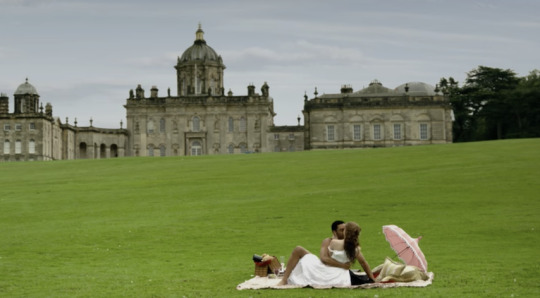
all to the tune of an orchestral version of Taylor Swift’s ‘Wildest Dreams.’
BUT
You know the course of true love never runs smooth. Our lovely couple has to hit a snag. And it’s in the form of animal husbandry, planting and a little putting of two-and-two together.
How Daphne finds out is sort of the same, but also different.
Like I mentioned before, I’d read this years ago. I’d forgotten about the particulars of this. So when I saw this scene in the Netflix series, I somehow sort of hazily remembered that that’s not what happened in the book. But as soon as I re-read it, I had to put it down. Not because the scene was well-written. But because I just had so many problems with it.
Which kind of makes me thankful that they changed it for Netflix. Because in the series, Simon doesn’t come inside Daphne but this is also what convinces her that he DID lie to her. Remember that earlier scene when Mrs. Colson, the housekeeper, tells Daphne the story of Simon’s parents? How his mother died in childbirth and how his father always wanted a son and blamed his wife when she miscarries? Then Mrs. Colson says, “A womb won’t quicken without strong, healthy seed.”
In the series, Daphne clues in to this when during one of their romps, AFTER she’d spoken with Mrs. Colson and the wheels started turning, she noticed Simon spend on her handkerchief. She then marches to her maid’s room and asks her for essentially a rushed version of sex ed. Then after Daphne and Simon have dinner, they have sex… and I honestly don’t know if Simon came in her or not. But that’s when she accuses him and Simon basically admits it, they then fight. From then on, their marriage becomes strained and they sleep in separate bedrooms. So that awful scene in the book doesn’t exactly appear in the series.
Book Simon comes home drunk because he and Daphne had been fighting because of THE LIE. He manages to convince her to stay with him in bed, and she does. Then she is awakened later and as she talks to him and starts basically caressing him in his sleep, he responds. Which she realizes that this is when she could do WHATEVER she wanted, have WHATEVER she wanted.
So she basically giddyups and rides him like a cowgirl and being super extra, impressing even Simon, as is written in the book. BUT things take a turn when he starts climaxing and she essentially uses what strength she has to pin him down so he couldn’t pull out.
He’s angry and is feeling betrayed and then he starts to stutter -- which makes him angrier, with her, with himself. He’s just a confusing mass of emotions at this point.
And then he leaves for one of his other estates. Daphne goes to London and her brothers visit. One day, she assumes she’s pregnant and sends a letter with Anthony to send to Simon. Simon receives said letter and promptly sets out for London.
In the series, this doesn’t happen. They’re basically living separate lives, apart from posing for a portrait, several social engagements and a ball.
In the book, Simon goes after Daphne who’d been out riding at Hyde Park and she tells him that as it turns out she’s not pregnant. They don’t exactly resolve things there, but at least they’re talking. Daphne’s brothers sort of accost them at Simon’s house demanding that he convinces them that he loves her. Which sort of terrifies Daphne, but Simon takes her to another part of the house and in there actually professes his love, which he does unknowingly in front of her brothers who followed them.
And then sex. This time they both finish. Together. Inside. With enthusiastic consent. On both sides.
In the series, we have sort of the same but in the rain. Not just the Bridgerton boys as audience, but all of their guests.
Then sex. This time they both finish. Together. Inside. With enthusiastic consent. On both sides.
In the series, it ends with Daphne giving birth to Simon’s heir. Then we see them saying good bye to Colin who’s off to tour the continent. Book Colin actually returned FROM the continent the night of Lady Danbury’s ball.
Then we get a hint of the next season, knowing that it’s going to be Anthony’s turn.
AT THE END OF THE DAY
What do I think?
Well, the series was HIGHLY entertaining. I enjoyed watching it, which, for me, is the chief purpose of TV shows like this. So that’s one box checked.
Was it faithful to the book?
Largely, yes. And whatever departures it made didn’t take away from the book, IMO.
Was I bothered about the ‘colorblind’ casting?
No. Like I said before, I had no problems believing the black actors were the characters they played. It wasn’t a shock and it certainly wasn’t distracting.
So I loved it; I may rewatch it from time to time while waiting for Season 2 as we go into Anthony’s story in, The Viscount Who Loved Me.
2 notes
·
View notes
Text
Edmund White: Reading is a Passport to the World
When I was a little child, my sister, who was nearly four years older, was astonished that I couldn’t read. We were in my mother’s old Ford, driving around the main square of Hyde Park, and my sister pointed to a sign and said, “You honestly can’t read that?”
“No,” I said sullenly. “What does it say?”
“Graeter’s,” she announced triumphantly, the name of Cincinnati’s premier ice cream maker. “Can’t you see that? What does it say to you?” She wasn’t being mean; she was genuinely puzzled. Reading was a magical portal—once you passed through it, you couldn’t even imagine going back.
I must have been four. Two years later I could read, or at least “sound out” syllables (that was the method then). When I realized that I could interpret these hieroglyphics, I felt so free, as if a whole new world had been opened to me. Now I could herar a chorus of voices, even those coming from other centuries and cultures. I was no longer bound to the squalid here and now, to my mother’s web-spinning of agreeable fantasies or my father’s sudden eruptions of rage, to the sweating summers of that age before air conditioning.
I remember toddling into my mother’s room, where she was taking a perfumed bubble bath in the late afternoon. I announced (or maybe thought), “I’m free. I can read.”
Could I really have had such an improbable thought at age six? Or have I just told myself that that thought occurred to me then? And yet I remember my mother’s sweetness, the good smell, the afternoon sunlight, and my very real feeling of joyful liberation. And, quite concretely, reading has always struck me as a passport to the world, one in which characters are more real than actual people, where values are more intense than in the dim light of reality, where characters fly up into destinies rather than paddle around in ambiguity.
I felt like a blind person who’d just regained his sight. I was no longer a Cincinnatian but rather an earthling. If things were clearly written in English, there was no text that was off-limits. I never read the standard children’s classics. No Wind in the Willows. Only recently did I get around to Treasure Island.
In my twenties and thirties no book was too ambitious for me; I worked my way through Theodor Adorno and Heinrich von Kleist, Roland Barthes and Michel Foucault, though I was drunk most of the time and often had to hold one eye shut. I suppose I was hanging out with a pretty brainy crowd back then, and I felt I had to keep up. I doubt I retained much, though in my thirties and forties I reviewed several books by Barthes and Foucault.
I was so driven back then, it never would have occurred to me to reread a book! My goal was to have read everything, or at least the major works that appealed to me, that seemed essential. Perhaps because I’d never done any graduate work, I felt inferior. I’d never read The Faerie Queene. Worse, I’d been a writer for eight years for Time-Life Books, the ultimate home of the middle-brow. Although I invariably said defensively, “I’m not an intellectual,” I wanted to be one—or at least to be able to refuse demurely that title. Sometimes I took comfort in the idea I was an artist, not an intellectual. I even resorted to the ridiculously snobbish notion I was a “gentleman amateur” and not an intellectual. But I’ve always wanted to have the choice to join any club, especially one that might reject me. For instance, I made a major effort to join the Century Club, for which one had to be sponsored by 11 or 12 current members. Two years after I was accepted, I resigned. Too many lawyers.
Now I do reread at least two books every year—Anna Karenina and Henry Green’s Nothing. Although these two novels are so different one from the other, they both reward closer scrutiny, so much so they scarcely resemble the same book one remembers having read the year before. People complain about the Kitty and Lvov parts of Anna Karenina, but that’s a frivolous charge. Their love stands in dramatic contrast to Anna’s and Vronsky’s passion and is the necessary counterweight to that tragic tale. In the same way, some readers treat Nothing the way they regard all comedy—as lightweight. Actually it is a profound study of the generations and social classes—and unexpectedly it sides with the older, richer people.
“Perhaps some prose is enough like a taut play script that it profits from being read aloud, but almost always a live reading of prose is an exercise in vanity.”
The other book I’ve reread five times in my life is Proust’s. When I was a teenager I read it as the bible of snobbism; it gave me a whole vocabulary to describe this vice that Proust calls “narrow but deep.” Now I read it as the definitive condemnation of snobbism.
For my memoir, I’ve reread a few favorites by Colette, Nabokov, and Tolstoy and read for the first time novels by Guyotat, Giono, and Malaparte. Do we prefer to revisit books we love or to explore the unknown? Are we happier to find new things in the old or to detect familiar themes and strategies in the utterly new and startling? The brilliant novelist of modern manners Alison Lurie once explained to me why she was more popular in England than in America. “For the English I’m writing about an unfamiliar subject [American academic and artistic life] in a familiar style of social satire, whereas for Americans I’m writing in an unusual style about familiar subjects.” Has she touched on an explanation of why we like certain books and not others?
*
Joe Brainard reportedly said on his deathbed, “The best thing about dying is that you never have to go to another poetry reading.” How many times I’ve had to sit through poetry readings in a stuffy room with subaqueous light at the end of a long day and fight against falling asleep! The mind loves a narrative, and in my half sleep my poor brain has spun cartoons made up of chance words, my embarrassment, trace memories (what Freudians call dismissively “the daily residue”), and my shipwrecked will to wake up, or at least not snore.
Everyone says poetry is an oral art, and perhaps some of it is meant to be read out loud. Good actors can make us understand passages in Shakespeare that use obsolete language, though I hate it when pedants hope to indicate the line break or the caesura. I could never make sense of The Tempest until I saw it onstage. On the page I could never keep track of all the characters. Charles Lamb argued in an essay that reading Shakespeare is preferable to seeing him produced, and maybe hammy acting and garish sets and thundering exits and entrances do topple certain of Shakespeare’s cloud castles, but great performances can dial into sharp focus even the vaguest verse.
But does modern poetry gain from being recited out loud? James Merrill was a smooth, trained reader and the smile in his voice could give the reader permission to laugh at his improbable mixture of metaphysics and gossip. His light social tone so often gives way to the sublime that a reader less civilized than he scarcely knows what is funny and what is serious (sometimes both at once, since he thought wisdom was expressed in puns and that the language itself is the collective unconscious).
Percussive poetry like Pound’s translation of the Anglo-Saxon The Seafarer as read by the author himself to the beat of drums can be riveting; a casual scanning of the page would never render the granitic, prehistoric force of this masterpiece. In his recitation (now on YouTube) Pound rolls his r’s, thuds the final d’s, and maintains a shaman’s monotone. Maybe Paul Verlaine’s musical verse (or John Keats’s) is improved by being read out loud, but most 20th- or 21st-century verse is too abstract or too dense to be understood on a single hearing. The mise-en-page, the line breaks, the Latinate or Anglo-Saxon origins of the words, as in tomb and grave (“The tomb in Palestine / Is not the porch of spirits lingering. / It is the grave of Jesus, where he lay”)—these are all elements that surrender themselves only to close reading.
With prose the problem is the speed. Everyone reads at a different pace, and some texts are not interesting or intricate enough to be dosed out at conversational speed. We get it; we want to scan it. Perhaps some prose is enough like a taut play script that it profits from being read aloud, but almost always a live reading of prose is an exercise in vanity. It may be valuable for the fiction writer to gauge the response of his audience, to listen for contradictions or unintended echoes, to detect where people’s attention wanders. But do these practical benefits for the writer outweigh the torture undergone by the public?
Silent, solitary reading (if the book is good) is the best conversation, with all the uhs and ahs edited out, the dead metaphors buried, the dialogue sharpened, the descriptions vivid, the suspense rising, the characters hovering between the unique and the representative. In the great Italian and French guides to good conversation during the Renaissance and 17th century, conversation must avoid pedantry and cruelty and seek above all to please and to entertain. Finally it must be natural; affectation is the worst sin, far worse than flattery, which may even be desirable. In her definitive study The Age of Conversation, Benedetta Craveri (granddaughter to the philosopher Benedetto Croce) argues that good conversation should not make anyone feel inferior or ill at ease but rather the object of a total consideration. And Simone Weil, the French religious philosopher, thought paying attention was a form of prayer.
The novelist or essayist should never mystify for no good reason. We should know why the marquise goes out at five o’clock (if it’s relevant). In an essay we should not be thrown off by academese. An idea may be difficult, but not its expression, as I learned from my beloved Marilyn; the words should be as lucid as possible. The assumption should be that the reader is intelligent but not necessarily informed.
__________________________________
Good read found on the Lithub
0 notes